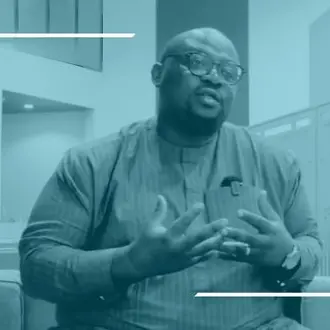With more than 15 years experience leading infrastructure projects across Latin America, Solangel Fernandez, SFMBA ’25, came to MIT Sloan with a clear purpose—to innovate and accelerate the impact of sustainable development.
From left to right: Jean-Jacques Yarmoff (Marblehead Light Commission), Bethany Patten (MIT Climate Policy Center), and Solangel Fernandez at S-Lab Poster Day
An opportunity to fulfill that purpose came when her Sustainable Business (S-Lab) course partnered her with the Marblehead Municipal Light Commission, a community-owned electric utility in Massachusetts.
“The energy transition will be built by utilities, and right now, they face some of their hardest decisions yet,” says Solangel, who was eager to explore how she could help small and mid-sized utilities make smarter choices in the face of increasing complexity.
Marblehead’s challenge reflected that of many utilities across the United States—reduce greenhouse gas emissions while keeping electricity affordable and ensuring fairness across customer groups. Solangel focused on two policy options under consideration by her S-Lab host—time-of-use rates and a solar feed-in tariff. To evaluate them, she developed a structured, multi-criteria decision framework. By integrating financial cost, equity impacts, and emissions reduction potential—and demonstrating how AI could enhance such analyses—her framework made trade-offs visible and gave decision-makers a transparent, companion tool for future planning.
“For me, institutions hold the key to making implementation happen, and supporting them in achieving their sustainability goals is fundamental to moving forward,” she says. “S-Lab gave me the chance to put that belief into practice.”
“This is the kind of transformation I came to MIT Sloan to pursue.”
What began as Solangel’s Action Learning project has since grown into a full-blown startup venture. Working full time with her team at MIT's Innovation Headquarters (iHQ), she is expanding on the model she created for her S-Lab host—building an AI system that enables utilities and corporations to plan smarter, act faster, and deliver infrastructure decisions with lasting impact.
Solangel Fernandez presenting at Boston AI Week
Through two pilot projects with utilities in Massachusetts, the startup—called GreenBridge—is beginning to demonstrate how decision intelligence can reduce planning costs, speed up program adoption, strengthen accountability, and help utilities align infrastructure investment with ESG and net-zero goals.
Her career track record reinforces this ambition: leading $1.5B in climate-resilient urban investments, passing national housing legislation, pioneering smart city and clean mobility solutions, and designing large-scale urban regeneration strategies.
For Solangel, this work has reinforced a central lesson—utilities are not just participants in the energy transition, they’re the ones who will implement it, while operating in one of the most challenging environments for innovation, shaped by regulation, legacy systems, and competing priorities.
“Complexity is unavoidable,” she says, “but with innovation and technology we should be able to transform even highly constrained conditions into real progress—delivering a reliable, equitable, and affordable energy transition. This is the kind of transformation I came to MIT Sloan to pursue.”
This view is grounded in Solangel’s constant research on utility decision-making, turning real-world challenges into opportunities to test, refine, and expand new methods for managing complexity.
I want to dedicate my work to the most vulnerable communities, ensuring they gain access to reliable, sustainable infrastructure and that progress is shared by all. Economic limitations and capacity constraints may seem immovable, but with innovation and technology we can unlock opportunities for lasting, meaningful change.
It can’t be sustainable if it’s not inclusive.
Solangel has served as Peru’s Minister of Housing; developed projects in the United Kingdom, India, Russia, Ukraine, and China; and is recognized as one of Latin America’s most influential public leaders in sustainable urban transformation. Throughout her career, she has chosen to work with organizations that believe infrastructure is more than physical assets—it is a tool to unlock opportunity, reduce inequality, and shape resilient communities. For her, Greenbridge is the same kind of tool.
“As organizations make decisions that have long-term effects, economic and financial data are usually addressed; social and environmental data are often unavailable or overlooked. We want to make those data easily accessible, so they can be part of every decision.”
Solangel Fernandez with Professor John Sterman at the Sustainability Certificate Graduation
Solangel’s goals and aspirations have been championed by many at MIT, including the Martin Trust Center for MIT Entrepreneurship, MIT Media Lab, MIT Sandbox Innovation Fund Program, MIT New England I-Corps Hub , MIT Sloan Fellows MBA Program, and the MIT Sloan Sustainability Initiative.
“To them, I say thank you for their constant support, for strengthening my growth and vision, and for fueling our team’s journey.”
Looking ahead
Solangel hopes to make a lasting contribution to the energy transition in the United States and, in the future, together with her team, expand GreenBridge to emerging markets, where constraints are greater and vulnerabilities sharper.
“I want to dedicate my work to the most vulnerable communities, ensuring they gain access to reliable, sustainable infrastructure and that progress is shared by all. Economic limitations and capacity constraints may seem immovable, but with innovation and technology we can unlock opportunities for lasting, meaningful change.”
The most rewarding aspect of her work, she says, is seeing real change on the ground—ensuring that sustainable, high-quality services finally reach the communities that have waited too long.
“That is what motivates me—making change happen, and making it happen sustainably.”



